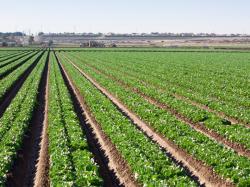Rabobank Study Explores Impact Of Consumer Demand For Local, Fresh Produce
February 15, 2013 | 3 min to read

FRESNO, CA — Consumer desire for a stronger connection to the farmers who grow their food is creating a demand shift in the U.S. produce industry. The move is highlighted in a report released today by Rabobank's Food & Agribusiness Research and Advisory (FAR) group titled "Local Foods: Shifting the Balance of Opportunity for Regional U.S. Produce." The report finds the growing local food movement, in which consumers seek out and purchase foods grown in closer proximity to them, is causing smaller regional producers to take market share from established producers who don't qualify as locally sourced.
Local buying opportunities such as farmers markets and roadside stands have long existed, but in more recent years, have gained popularity with consumers who want a better understanding and connection to their food. Such interest has changed the competitive landscape of the U.S. produce industry as supermarkets and restaurants have latched onto the local trend. This movement has evolved into a permanent mainstream trend, which is generating more opportunities for regional U.S. growers who traditionally had less market share than larger, more well-established national suppliers.
"Fresh, local produce has become a signature part of the produce section in many U.S. supermarkets and consumers are taking advantage of the option," said Karen Halliburton Barber, assistant vice president and senior agricultural analyst with FAR and the author of the report. "In order to fill this need, retailers are turning to regional and local growers, creating an above-normal increase in competition for the summer season business of producers in California, the traditional national growing region for U.S. produce."
The report highlights the explosion of regional U.S. production in areas such as Oregon, Washington, Michigan, the Ohio Valley, Georgia, Florida, Wisconsin, New York, New Jersey and the Carolinas. Many growers in those regions have seized the opportunity and expanded their acreage to accommodate the increased demand.
"Most growers in California are banking on their hard-won reputation for consistency, quality and safety of their products," said Barber. "However, other national producers are recognizing the need to adapt to more local demand and have begun partnering with larger regional producers."
Barber's report goes on to note that the local food movement appeals to various consumer groups for several reasons, including an interest in sustainability and the reduction of 'food miles,' a desire for organic and natural foods and ethical issues. Many consumers view agriculture as the core of their community identity and feel compelled to make local purchases they believe have a greater social impact. However, a move to a stronger local focus isn't without its challenges. The conventional industry view is that locally grown food is more expensive and less efficient simply relating to economies of scale. In addition, global food production compared to local offers the advantages of year-round accessibility to specific foods, thus increasing global free trade — ideally leading to the reduction of global hunger and driving economic growth.
The report concludes that the local foods trend will continue to expand for fresh produce over the next five years and continue to offer opportunities for retailers and foodservice operators to attract customers. It points out that national growers, specifically in California, will need to adapt their business models to accommodate the desire for local, fresh produce.
About Rabobank, N.A.
Rabobank, N.A. is a California community bank and a leading provider of agricultural financing and full-service banking products to California consumers, businesses and the agriculture industry. With nearly 120 retail branches, we serve the needs of communities from Redding to the Imperial Valley through a regional structure that promotes local decision-making and active community involvement by our employees.
Rabobank, N.A. is a division of the Rabobank Group, the premier lender to the global food and agricultural industry and a financial services leader providing commercial, retail and agricultural finance solutions in 48 countries around the world. From its century-old roots in the Netherlands, Rabobank has grown into one of the world's largest and safest banks. www.rabobankamerica.com : www.rabobankamerica.com/
About Rabobank International Food & Agribusiness Research and Advisory (FAR)
The Rabobank International Food & Agribusiness Research and Advisory (FAR) group is a global team of more than 80 analysts who monitor and evaluate global market events that affect agriculture worldwide. This international team works to gather key insights into commodity markets; conduct in-depth analysis of the factors that drive sector success (or failure); and look at the megatrends that ultimately influence clients' capital strategy. These analysts are internationally respected experts in everything from protein to produce, inputs to oilseeds, and their knowledge is shared regularly with Rabobank, N.A. customers.
Source: Rabobank, N.A.
